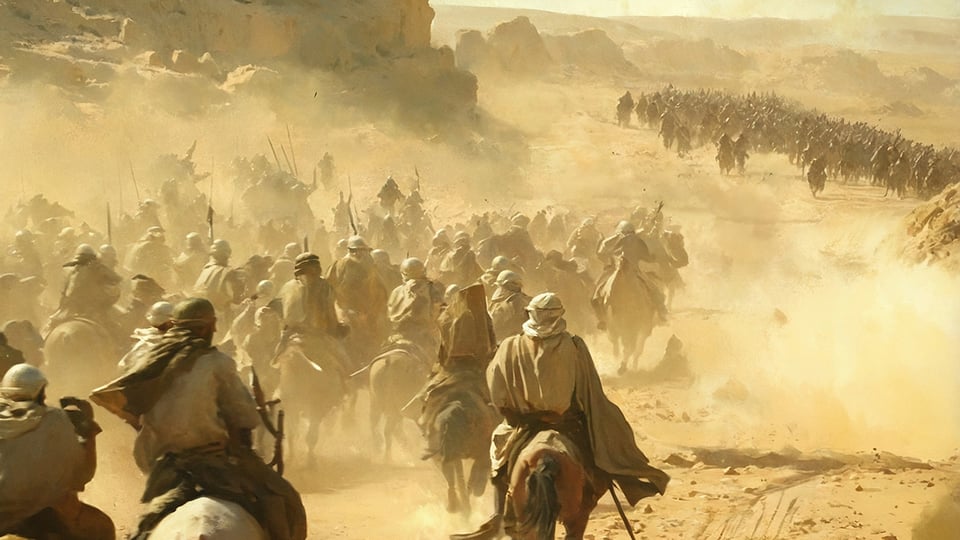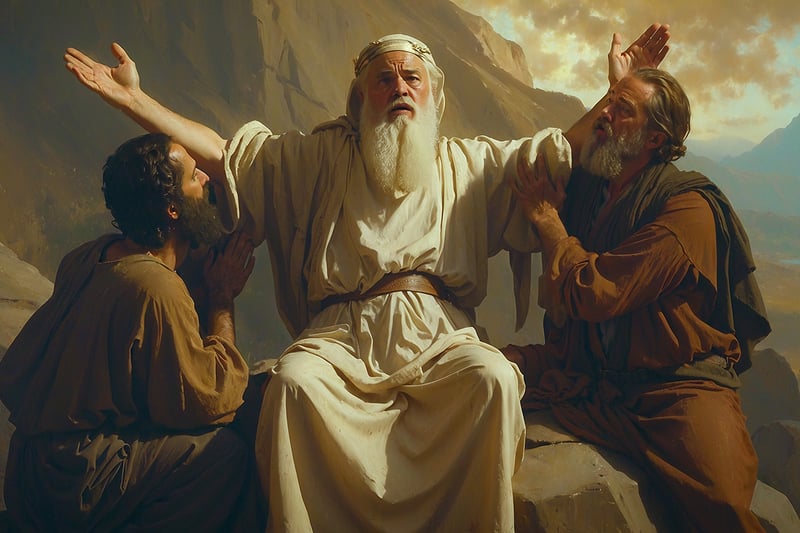Defeating the Enemies: Overcoming Weaknesses
We all have spiritual weaknesses that can make us especially susceptible to sin and temptation. How can we battle and overcome our weaknesses?

In the previous post in this series, we examined the influence of Balaam and how he cunningly caused Israel to sin through the lure of sexual temptation and false worship. We focused on the lesson that God wants us to be zealous and eliminate sin from our lives.
In this blog post, we’ll look at another enemy Israel faced: the Amalekites. These vicious people revealed a glaring weakness of the Israelites.
What was that weakness and what does it teach us about conquering our weaknesses today?
The cruelty of the Amalekites
The Amalekites were some of the most ruthless and vicious of Israel’s enemies. They were the descendants of Amalek, who was a grandson of Esau—the son of Eliphaz, Esau’s firstborn (Genesis 36:10-12).
When Israel left Egypt, Amalek cruelly attacked the “rear ranks,” which were Israel’s weakest people. The rear ranks were where the stragglers were, likely women, families with young children, the elderly, the wounded and the “tired and weary” (Deuteronomy 25:18).
They were the easiest to successfully attack.
The attack methods of the Amalekites mirror how Satan often works. He targets the weak. When he attacks the strong, he focuses his attacks on their greatest weaknesses.
God did not want Israel to fight against Edom because they were their brothers (Numbers 20:21; Deuteronomy 23:7), so Israel did not mean any harm to them. Yet Amalek nonetheless made an unprovoked attack on Israel.
Interestingly, the attack methods of the Amalekites mirror how Satan often works. He targets the weak. And, when he attacks the strong, he focuses his attacks on their greatest weaknesses.
Peter described Satan as “a roaring lion, seeking whom he may devour” (1 Peter 5:8). A lion hunts the weak, the stragglers of the herd, the wounded and the vulnerable. (To learn more about Satan’s methods, read “How to Resist Satan, the Roaring Lion.”)
The Amalekites were the first enemy to attack Israel coming out of Egypt (Exodus 17:8).
So, what does the Israelites’ experience with the Amalekites teach us about our Christian battle against sin?
A sin that appears in our weakness
Even when Christians strive to follow God and overcome the ways of this world, they can still find it difficult to break free from certain sins and temptations. Those particular sins are the most difficult to vanquish and can, if succumbed to, draw us off God’s path.
You might say these weaknesses represent a Christian’s spiritual Amalekite.
Christians must be extremely careful of their Amalekites, sins that attack them at their weakest—when they are tired, weary, exhausted and not at their best.
Consider Job.
Christians must be extremely careful of their Amalekites, sins that attack them at their weakest—when they are tired, weary and exhausted.
Satan took away his children and possessions, yet Job did not sin (Job 1:6-22). Next, Satan took away his health, leaving him with painful boils, yet Job did not sin (Job 2:1-10).
But when his friends mentally tormented him, accusing him of deserving what happened to him because of a mysterious hidden sin, Job stumbled by declaring himself more righteous than God (Job 34:5; 35:2; compare Job 19:6; 23:4).
When Job was at his weakest, when he was tired and weary, his Amalekite appeared.
Thankfully, he eventually caught himself and repented. Even when we lose a spiritual battle, repentance and God’s forgiveness allow us to get back up and still prevail.
God said He would be at war with the Amalekites “from generation to generation” (Exodus 17:16).
Similarly, some weaknesses are things we struggle with until the day we die.
But what should we do when we are at our weakest? How can we overcome such a difficult enemy?
Relying on God
To defeat the Amalekites, Moses had to keep his hands raised. As long as his arms were up, Israel was victorious in the battle. But when Moses lowered them, Amalek began to gain the advantage (Exodus 17:8-11).
What does the lifting of hands have to do with winning a battle?
Israel prevailed against the Amalekites as long as Moses' hands were raised.
They had to faithfully rely on God and follow Moses, God’s chosen servant.
The lesson for Christians today is that to defeat the sins that attack them when and where they are vulnerable, they must rely on God and stay connected to His Body, the Church of God.
When Christians distance themselves from God and His Church, they become more vulnerable to weakness and attacks. They become less vulnerable when they draw close to God through prayer and study.
The central lesson is this: We need to stay close to God, in humility and prayer, to have His protection from sin.
To learn more, read “God, Help Me!”
But sometimes we need extra help with our weaknesses.
Helping one another
Back to the example of Moses raising his hands.
When his arms began to get heavy, Aaron and Hur positioned themselves beside Moses and supported his arms (Exodus 17:12).
After seeking God’s help, we may also need someone to lift our hands. Our Christian walk isn’t only between us and God. We also need the support and encouragement of our fellow Christians (Hebrews 10:24-25).
Spiritually lifting another person’s hands could be through direct help, encouragement and support, or it could be lifting the person’s name before God in our prayers. Christians should constantly be on the lookout for others to see if someone needs his or her hands lifted.
To learn more, read “What Is the Meaning of John 15:13: ‘Lay Down One’s Life’?”
Inherited struggles
Amalek continued to be a thorn in the flesh for Israel, attacking them during the times of the judges and kings of Israel (see, for example, Judges 3:13, 6:3, 10:12; 1 Samuel 30:1).
Likewise, our Amalekite can also come in the form of generational weakness—weaknesses that have been in our family for generations.
Some may inaccurately call this a family curse, but this terminology implies that it’s imposed on us and that we have no control. (To learn more, read “Are the Penalties for Sins Passed Down?”)
However, sin is always a choice. It is a decision we make, even though we sometimes sin out of ignorance or because of a deep character flaw or weakness.
Generational sins are more accurately described as learned behavior.
In God’s commandment against idolatry, He warned that this sin would affect “the third and fourth generations” (Exodus 20:5). The example and pattern of idolatry would become a family example that would be learned and practiced by future generations.
Though certain character traits may dominate our family lines, we don’t have to let those traits define us. Consider Josiah. His father, Amon, and his grandfather, Manasseh, were evil kings (2 Chronicles 33:1-2, 20). Yet Josiah refused to be defined by the sins of his fathers and chose to wholeheartedly follow God (2 Chronicles 34:1-3).
Just as sin is a choice, righteousness is a choice as well.
True Christians must never become comfortable with sin or rationalize it because they learned it from their upbringing. We have to look at all sin realistically—as something that can separate us from God and lead to eternal death.
The lesson is clear: Some weaknesses are generational, but we must choose to deal with and overcome them.
Overcome and strengthen our areas of vulnerability
Sin is an insidious enemy that hides in the strongholds of our minds. We need to conquer and overcome it.
We are at war against sins that arise when we are tired and weak. These types of sins are like the Amalekites, who attacked ancient Israel when they were most vulnerable. To successfully battle these sins, we must pray to God for help and pray for and support each other.
God can provide us the strength to overcome our sins and help us overcome our deepest weaknesses. God holds out a reward “to him who overcomes” (Revelation 2:7, 17).
Past blog posts in this series:
- Defeating the Enemies: Overcoming Spiritual Strongholds
- Defeating the Enemies: Overcoming Societal Influences
Date Posted: June 21, 2024



